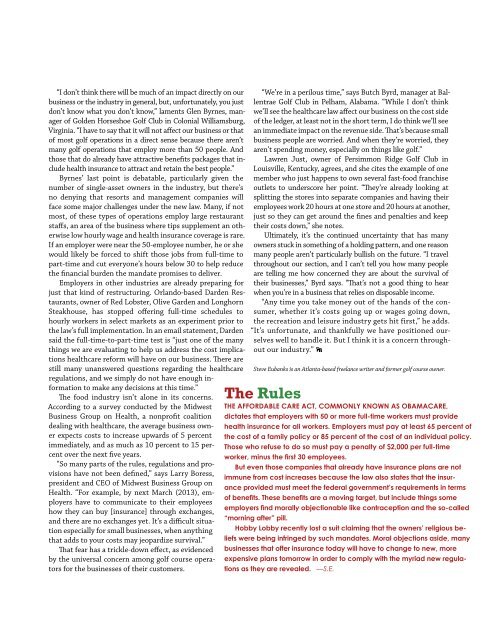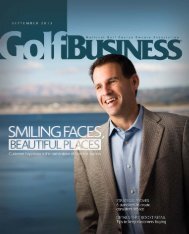Community - GolfBusiness
Community - GolfBusiness
Community - GolfBusiness
Create successful ePaper yourself
Turn your PDF publications into a flip-book with our unique Google optimized e-Paper software.
“I don’t think there will be much of an impact directly on our<br />
business or the industry in general, but, unfortunately, you just<br />
don’t know what you don’t know,” laments Glen Byrnes, manager<br />
of Golden Horseshoe Golf Club in Colonial Williamsburg,<br />
Virginia. “I have to say that it will not affect our business or that<br />
of most golf operations in a direct sense because there aren’t<br />
many golf operations that employ more than 50 people. And<br />
those that do already have attractive benefits packages that include<br />
health insurance to attract and retain the best people.”<br />
Byrnes’ last point is debatable, particularly given the<br />
number of single-asset owners in the industry, but there’s<br />
no denying that resorts and management companies will<br />
face some major challenges under the new law. Many, if not<br />
most, of these types of operations employ large restaurant<br />
staffs, an area of the business where tips supplement an otherwise<br />
low hourly wage and health insurance coverage is rare.<br />
If an employer were near the 50-employee number, he or she<br />
would likely be forced to shift those jobs from full-time to<br />
part-time and cut everyone’s hours below 30 to help reduce<br />
the financial burden the mandate promises to deliver.<br />
Employers in other industries are already preparing for<br />
just that kind of restructuring. Orlando-based Darden Restaurants,<br />
owner of Red Lobster, Olive Garden and Longhorn<br />
Steakhouse, has stopped offering full-time schedules to<br />
hourly workers in select markets as an experiment prior to<br />
the law’s full implementation. In an email statement, Darden<br />
said the full-time-to-part-time test is “just one of the many<br />
things we are evaluating to help us address the cost implications<br />
healthcare reform will have on our business. There are<br />
still many unanswered questions regarding the healthcare<br />
regulations, and we simply do not have enough information<br />
to make any decisions at this time.”<br />
The food industry isn’t alone in its concerns.<br />
According to a survey conducted by the Midwest<br />
Business Group on Health, a nonprofit coalition<br />
dealing with healthcare, the average business owner<br />
expects costs to increase upwards of 5 percent<br />
immediately, and as much as 10 percent to 15 percent<br />
over the next five years.<br />
“So many parts of the rules, regulations and provisions<br />
have not been defined,” says Larry Boress,<br />
president and CEO of Midwest Business Group on<br />
Health. “For example, by next March (2013), employers<br />
have to communicate to their employees<br />
how they can buy [insurance] through exchanges,<br />
and there are no exchanges yet. It’s a difficult situation<br />
especially for small businesses, when anything<br />
that adds to your costs may jeopardize survival.”<br />
That fear has a trickle-down effect, as evidenced<br />
by the universal concern among golf course operators<br />
for the businesses of their customers.<br />
“We’re in a perilous time,” says Butch Byrd, manager at Ballentrae<br />
Golf Club in Pelham, Alabama. “While I don’t think<br />
we’ll see the healthcare law affect our business on the cost side<br />
of the ledger, at least not in the short term, I do think we’ll see<br />
an immediate impact on the revenue side. That’s because small<br />
business people are worried. And when they’re worried, they<br />
aren’t spending money, especially on things like golf.”<br />
Lawren Just, owner of Persimmon Ridge Golf Club in<br />
Louisville, Kentucky, agrees, and she cites the example of one<br />
member who just happens to own several fast-food franchise<br />
outlets to underscore her point. “They’re already looking at<br />
splitting the stores into separate companies and having their<br />
employees work 20 hours at one store and 20 hours at another,<br />
just so they can get around the fines and penalties and keep<br />
their costs down,” she notes.<br />
Ultimately, it’s the continued uncertainty that has many<br />
owners stuck in something of a holding pattern, and one reason<br />
many people aren’t particularly bullish on the future. “I travel<br />
throughout our section, and I can’t tell you how many people<br />
are telling me how concerned they are about the survival of<br />
their businesses,” Byrd says. “That’s not a good thing to hear<br />
when you’re in a business that relies on disposable income.<br />
“Any time you take money out of the hands of the consumer,<br />
whether it’s costs going up or wages going down,<br />
the recreation and leisure industry gets hit first,” he adds.<br />
“It’s unfortunate, and thankfully we have positioned ourselves<br />
well to handle it. But I think it is a concern throughout<br />
our industry.”<br />
Steve Eubanks is an Atlanta-based freelance writer and former golf course owner.<br />
The Rules<br />
THE AFFORDABLE CARE ACT, COMMONLY KNOWN AS OBAMACARE,<br />
dictates that employers with 50 or more full-time workers must provide<br />
health insurance for all workers. Employers must pay at least 65 percent of<br />
the cost of a family policy or 85 percent of the cost of an individual policy.<br />
Those who refuse to do so must pay a penalty of $2,000 per full-time<br />
worker, minus the first 30 employees.<br />
But even those companies that already have insurance plans are not<br />
immune from cost increases because the law also states that the insurance<br />
provided must meet the federal government’s requirements in terms<br />
of benefits. These benefits are a moving target, but include things some<br />
employers find morally objectionable like contraception and the so-called<br />
“morning after” pill.<br />
Hobby Lobby recently lost a suit claiming that the owners’ religious beliefs<br />
were being infringed by such mandates. Moral objections aside, many<br />
businesses that offer insurance today will have to change to new, more<br />
expensive plans tomorrow in order to comply with the myriad new regulations<br />
as they are revealed. —S.E.




